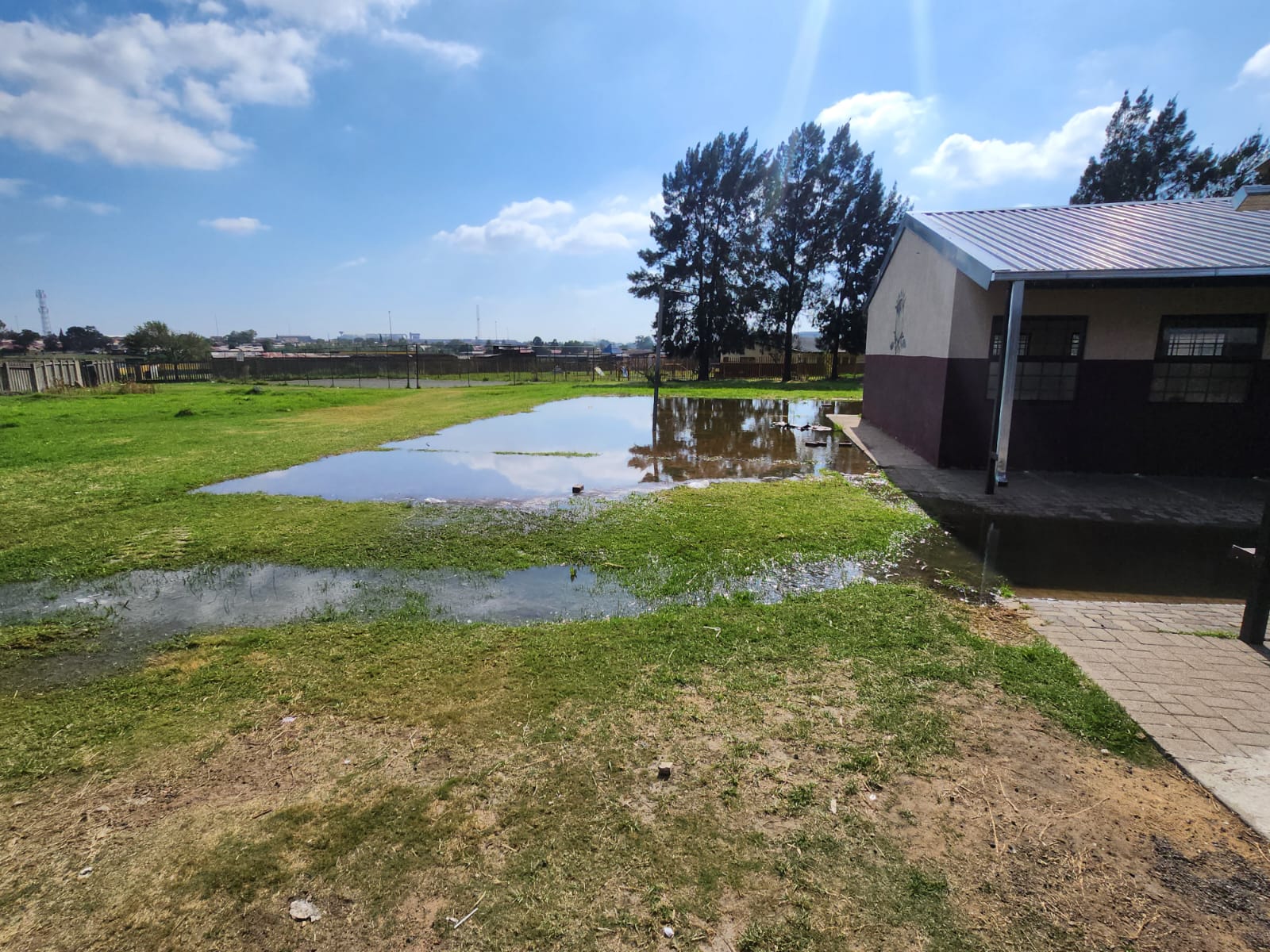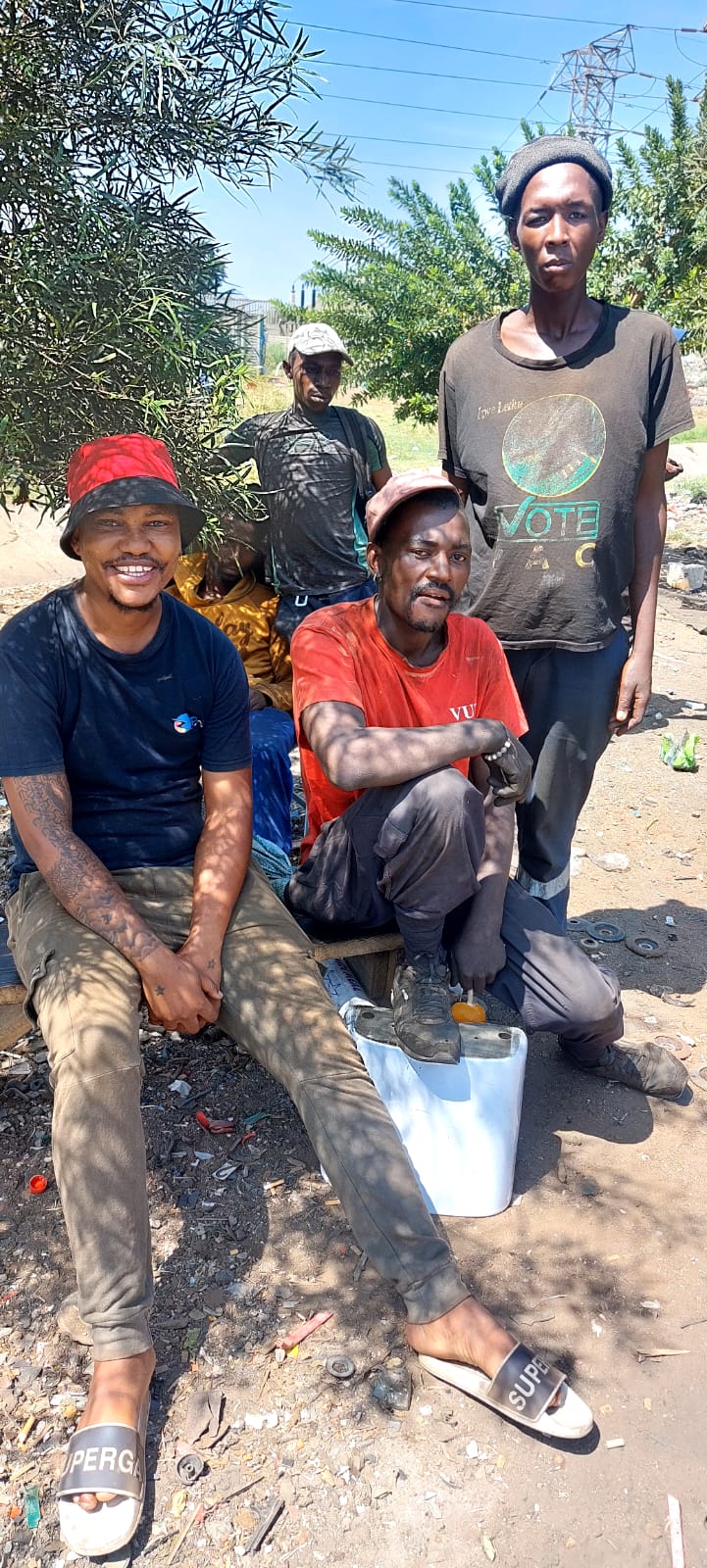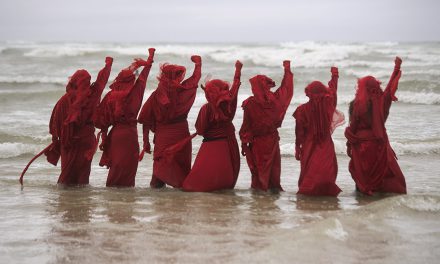In the grassy yard surrounding Phuthulla primary school in Boipatong, Emfuleni, is a narrow, muddy trench where sewage wastewater drains freely. Young children are just metres away in their classrooms, built of asbestos containers during the Apartheid years more than 50 years ago.
The sewage snakes its way from under a gap in the prefabricated wall separating the top, southern perimeter of the school, where it has been illegally redirected from the houses cramped too close to the wall on the other side. It ends up in a rubbish-clogged, stagnant mess on the other side near the school’s northern perimeter.

Phuthulla primary school after rains. Sewage spill forms lakes around the classroom buildings. Pic supplied.
On a bad day after rain, the wastewater turns into fetid lakes fringing the two blocks of classrooms. The problem has not been properly addressed for eight years, says a senior staff member of the school, who wished to remain anonymous. “It is a health hazard. Council contractors have been sent in the past, but their repairs were ineffective, and there is no follow-up. The staff here try to dig the trenches wider themselves, to let the wastewater flow, but when it rains, we are flooded again,” he says.
The learners at Phuthulla regularly fall ill, suffering from asthma and skin rashes. Parents have pulled their kids out of the school, even though there are few other primary school options for impoverished parents in this beleaguered township.
On the other side of a palisade fence on the school’s northern perimeter is a pre-primary school, eerily devoid of the toddlers it is meant to cater for. “It is closed because all the sewage flows downhill and gathers there. So Grade R kids cannot use the classroom or the playground,” explains the staff member.
Mamelodi Street separates the school from the community centre across the way, and it is lined with bigger piles of stinking rubbish, dumped by a community that has long given up on regular refuse collection services.
Late in the afternoons and evenings, the derelict, roofless building adjoining the centre becomes a gathering spot for Nyaopi and Mandrax addicts, says Reginald Waketsi, chairman of the SETA-funded Emfuleni Local Youth Forum. “We have a big drug problem here, as well as teenage pregnancies. A few newborns have been rescued from the skips around here,” he says.
The Emfuleni Local Municipality (ELM), encompassing Evaton, Sebokeng, Sharpeville, Boipatong, Bophelong and Tshepiso townships, remains one of the poorest performing municipalities in the Gauteng province, as can be seen in GGA’s Governance Performance Index launched earlier this month.
The sewage/wastewater crisis in this area reached a head last July, when the Gauteng High Court ordered several government ministers and the Gauteng Premier to stop the sewage pollution of the Vaal River and its tributaries, caused by Emfuleni’s collapsed wastewater treatment system.
The court found that the “discharge of raw or inadequately treated sewage by the first respondent (Emfuleni local municipality) from its municipal wastewater care and management system into the Rietspruit River and/or the Klip River and/or the Vaal River and/or the Vaal River Catchment Areas” was in contravention of the National Environmental Management Act (Nema) and National Water Act “and must be prevented”.
But a site visit by GGA a day before the Sharpeville massacre commemorations on 21 March exemplified the toll that the crumbling wastewater infrastructure and illegal dumping, with its public health dangers and the extensive harm caused to the ecosystem, has already taken on its communities.
Ironically, illegal dumping has become all but unavoidable in Emfuleni, due to the closure of landfill sites due to non-adherence to license conditions. At the landfill we visited on the corner of Nobel Blvd and Steve Tshete street, similar to other landfills in the area, residents and businesses have taken to simply dumping on its perimeter, creating an expanding swathe of refuse beginning to encroach on the houses nearby.
Watch video here: https://twitter.com/i/status/1772910413845237875
Reversing the depredation here, decades in the making, will take prioritised budget allocation and political commitment, impossible currently given that the council, according to its latest 2022/23 audit report, is essentially bankrupt, owing its creditors nearly R9 billion – the biggest creditor being Eskom (owed R6.8 billion). Eskom finally took the matter to court last year and had all the municipality’s accounts attached.
“As a result, the municipality can only access those accounts to pay employee salaries and nothing more. Without control of these accounts, the municipality is non-functional, can’t pay its debtors and is unable to access much-needed grants to implement service delivery initiatives,” said China Dodovu, chairman of the Select Committee on Cooperative Governance and Traditional Affairs, Water and Sanitation and Human Settlements (COGTA), in a statement last July.
In the audit, Emfuleni also recorded a 172% increase in unauthorised, irregular, fruitless and wasteful expenditure, “an environment that will encourage acts of corruption,” commented Dodovu. Corrupt tenders are the reason the waste infrastructure in Emfuleni only gets worse, according to Waketsi. “Favoured contractors are appointed and sent to do a quick fix on a pipe, then never come back,” he says.
More insidious than the pollution in this area, so visible and ugly, is the ravages of unemployment, which is as high as 57%. On the corner of Nobel Blvd and Bakoena street, a group of youths crouch like crows, waiting for trucks to pull out of Cape Gate steel manufacturers.
Watch video here: https://twitter.com/i/status/1772905502323708078
As a truck passes through, they run and jump on its front and back, scampering to the top of its pile of scrap steel to quickly forage before jumping off as the truck gathers speed. It’s a deadly way to make a living. Men have died under a truck’s wheels, or been crippled for life, says Sabata Sethibe, the senior of a group who spends their days under a tree, watching the entrance of Cape Gate.
“It’s a risk we take because there is nothing else for us. I can make R8000 a month from the steel I sell as scrap,” he says. “Most of us are child-headed households, so we have mouths to feed. I have been doing this for 10 years,” says Sethibe, who qualified in HR and marketing from Motheo TVET college in Bloemfontein in 2016.

Sabata Sethibe and his friends. Pic by Helen Grange
As we leave Emfuleni, we drive past Sharpeville to see the preparations taking place for Human Rights Day and President Cyril Ramaphosa’s visit. An expansive white marquee is being set up and security detail is everywhere outside the George Thabe stadium, where the Sharpeville massacre of 69 peaceful protesters took place 64 years ago.
This event came to symbolise the struggle against Apartheid and the push towards political freedom that came with the first democratic election in 1994. For the members of the Emfuleni Local Youth Forum, that struggle was never really won. Says Waketsi, “What freedom is there when people are living in this kind of poverty, and literally go hungry daily?”
This article first appeared in Daily Maverick on 11 April 2024.
Helen Grange is a seasoned journalist and editor, with a career spanning over 30 years writing and editing for newspapers and magazines in South Africa. Her work appears primarily on Independent Online (IOL), as well as The Citizen and Business Day newspapers, focussing on business trends, women’s empowerment, entrepreneurship and travel. Magazines she has written for include Noseweek, Acumen, Forbes Africa, Wits Business Journal and UJ Alumni magazine. Among NGOs she has written or edited for are Gender Links and INMED, a global humanitarian development organisation.












